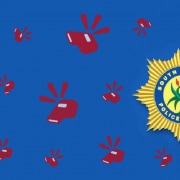|
Getting your Trinity Audio player ready...
|
The South African Police Service (Saps) presented a mixed bag or results in its 2021/2022 annual report, tabled before the parliamentary standing committee for police (Scop) in mid-October – and the committee was not impressed.
At the same time Scop heard from the Auditor-General of South Africa (Agsa) on the audit outcomes for the Department of Police, as well as from the Directorate for Priority Crime Investigations and the Civilian Secretariat for Police Service, who also presented their 2021/22 annual reports
There were gains and there were losses for Saps, and one of the most concerning losses was that of 712 Saps-owned firearms which were reported lost or stolen in 2021/22. The set target – already reduced from the previous year, as were several other targets – was 508.
The reason for these missing firearms, according to the annual report, was the escalation of crime against Saps members, including, but not limited to robbery in townships, housebreaking, theft from dwellings, and negligence by members.
In the latter case, Corruption Watch raised concerns about missing firearms as far back as 2014, around the time of the discovery of a large arms cache in Norwood, Johannesburg. Weapons in Saps’ possession and earmarked for destruction, were part of the cache, and how they left the custody of the police force was not known at the time – but corruption was suspected.
This situation falls under Saps programme 1, Administration, for which 81% of targets were achieved. Nor did programmes 2 and 3 – Visible Policing and Detective Services – stand out, with target achievement rates of 71% and 52% respectively. Programme 4, Crime Intelligence, was the most successful with 92% of targets reached.
Committee members were unmoved by the overall performance of the police force, saying that in its present state it was unable to carry out its basic responsibilities such as visible policing and detective services. “We have a failing police system in this country; they are unable to do their work and they are regressing in very basic policing functions … we are spending the police budget but no proper services are being experienced by the people on the ground.”
When a department achieves only half of its targets by using up its whole budget, members said, there is something fundamentally wrong in the system within that department.
Saps misleading the police committee
Committee members described the audit report as “a shame on the South African Police Service”, saying that in the Agsa report it was noted that for programmes 2 and 3, the underlying records materially differed from the reported statistics in several areas, such as the number of reported contact crimes, the number of stolen Saps firearms recovered, the number of reported crimes committed against women and children, and the percentage of DNA exhibits finalised.
“We are misled by the South African Police Service … and this is not the first time that we hear of a difference between the reported cases and what the audit reveals.”
The Agsa report, too, noted that the achievement of targets was not aligned to the reality of the country in terms of crimes because the achievements were not supported by accurate records. “Higher achievement by the department, however this is not translated to the actual realities of society.”
Acting Scop chairperson Tina Joemat-Pettersson chastised the Saps presentation team. “We have consistently been saying that the presentations we receive are inaccurate … you are coming to our meetings and you are misleading us. This is a serious offence.”
Joemat-Pettersson advised national police commissioner General Sehlahle Fannie Masemola, who was in the meeting, that as he is the accounting officer, the committee would be contacting him formally to account for the fact that his team misleads them.
“The committee legally cannot accept this any longer. The committee will be held legally responsible for accepting information that was presented to it, which is inaccurate. We cannot tolerate it, and we will have to take serious action. This is not just the committee expressing its view – what you are doing to this committee is a criminal offence.”
It was up to police minister Bheki Cele, also in the meeting, to “get his house in order,” said members. “We have police officers who do what they please in police stations. We have police officers who take bribes for cases. Police stations are in chaos.”
Failing the public
In Saps programme 3 (Detective Services), the service had managed to finalise only 18.4% – 10 472 of 56 653 case dockets for contact crimes older than three years. Committee members pointed out that this means 46 000 criminal cases older than three years have not been resolved. The continuing shortage in the detective division means that the number of case dockets is increasing. South Africa has lost one detective per day over the last three years, according to statistics, and the committee expressed their hope that Saps would identify solutions to recruit and remunerate detectives to an adequate standard, to keep them in the service.
Committee members further asked if it was humanly possible for a detective with over 200 dockets to do justice to any case.
Only 8.78% (22 244 of 253 428) of DNA intelligence cases were processed within 90 calendar days in 2021/22.
These two situations were undermining the criminal justice system, said the committee, and with regard to the latter problem, failing the women and children of South Africa.
Irregular expenditure an ongoing problem
Committee members were concerned with the irregular, fruitless and wasteful expenditure within Saps, and asked for details of what was being done to bring this down to zero. “When the money is misused, services are robbed from communities who need them.”
In accordance with treasury regulations, Agsa has given Saps 90 days within which to determine the full extent of the fruitless and wasteful expenditure. If confirmed, this would be disclosed in the next financial period.
The reasons for this waste of taxpayers’ money, said Agsa, included:
- • Poor record-keeping processes for case dockets and storage facilities at the forensic service laboratory;
- • Consequence measures were not always implemented at the appropriate level;
- • Inadequate reviews by management to prevent material misstatements on reported;
- • Inadequate review and monitoring controls over the preparation of the financial statements;
- • Management was not effective in developing and monitoring the implementation of audit action plans. Key root causes of findings were not always identified and addressed;
- • Controls were not always effective to detect and prevent irregular expenditure.
However, Agsa has found in the past that investigations were started but not concluded, or they were not being done in the 90 days prescribed by the National Treasury framework. Once that has been determined, then consequence management will kick in. This was something the police department would want to expedite, said Agsa, because if irregular, fruitless and wasteful expenditure cases have been put on hold for a long time, and officials have left by the time they are concluded, then consequence management becomes a challenge.








